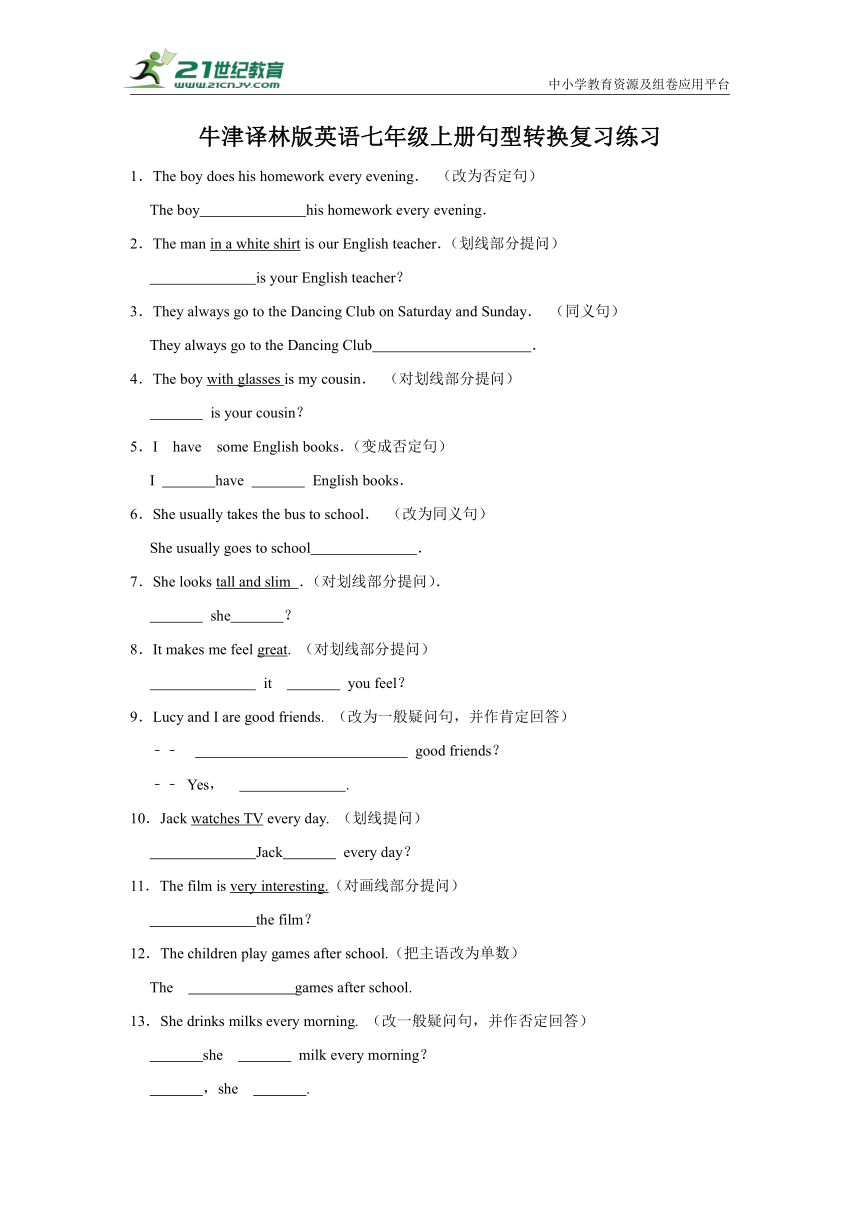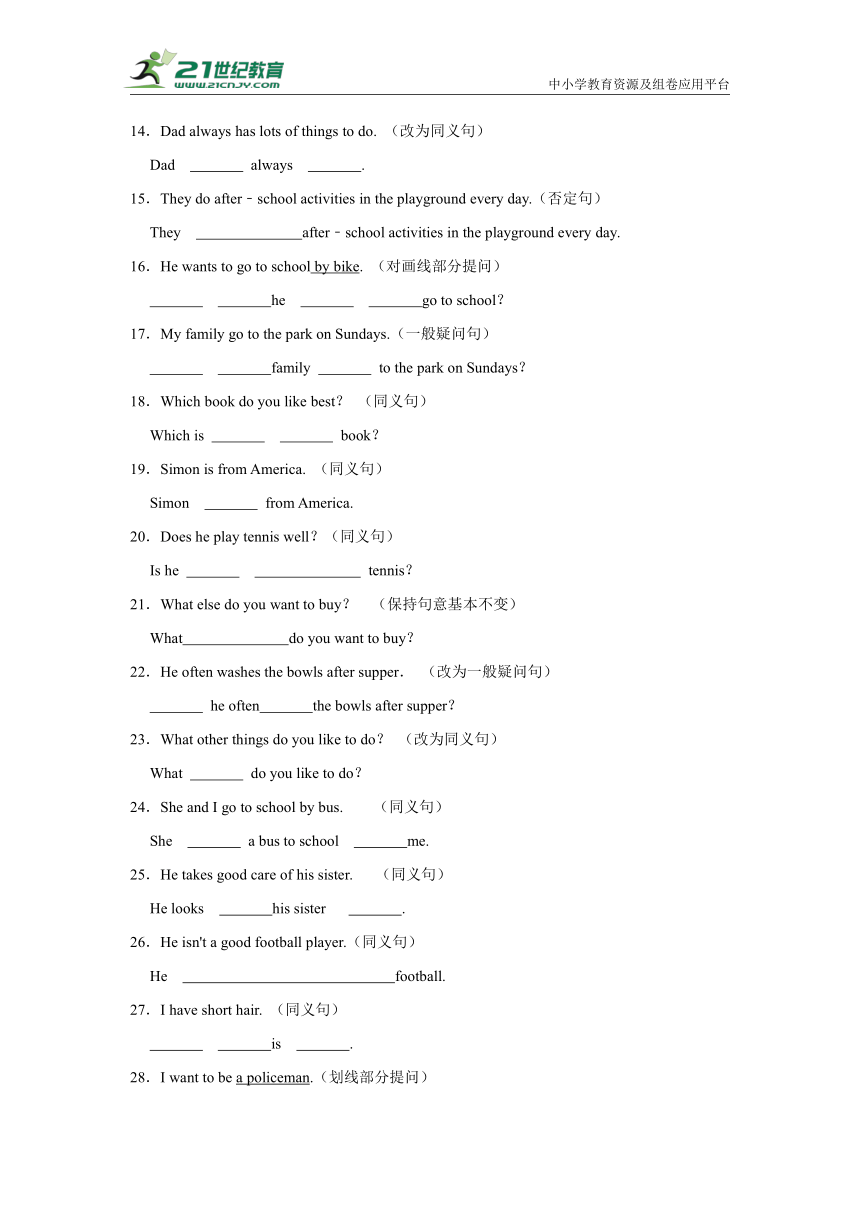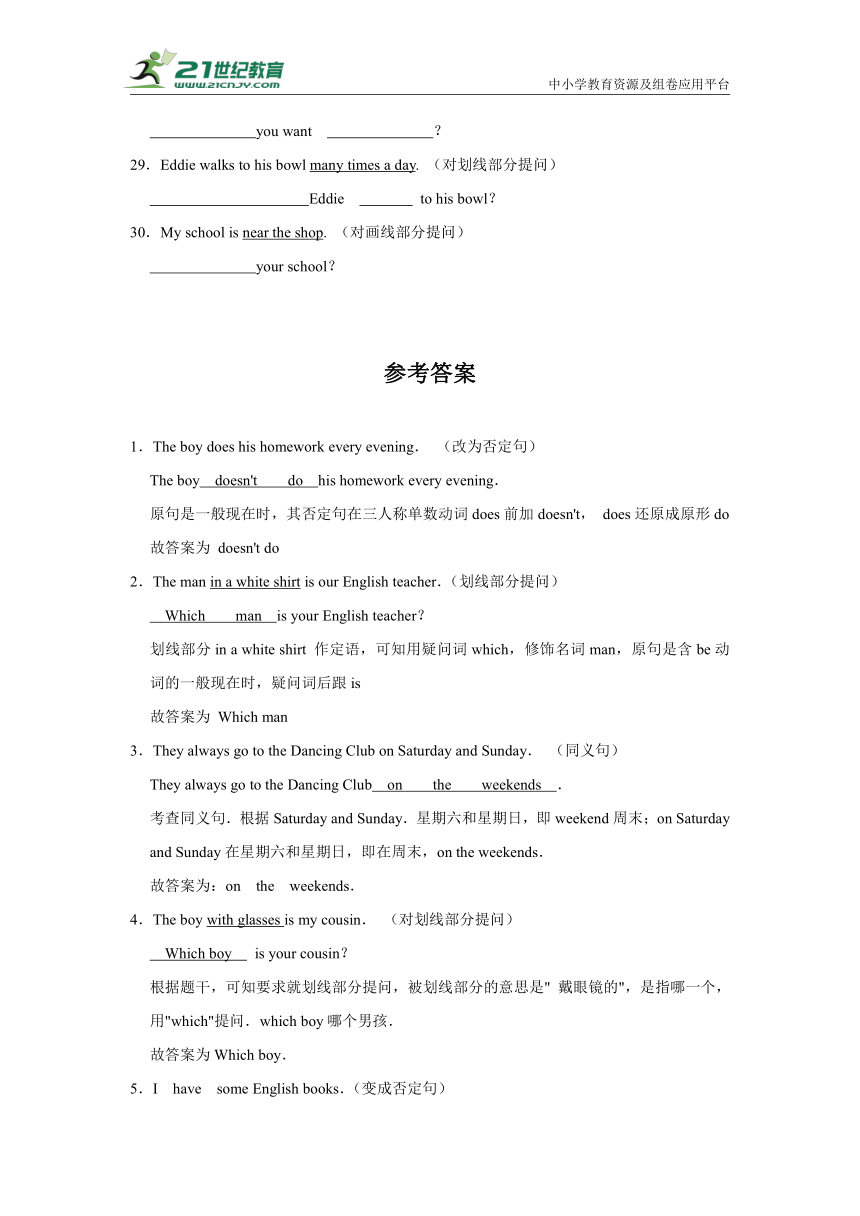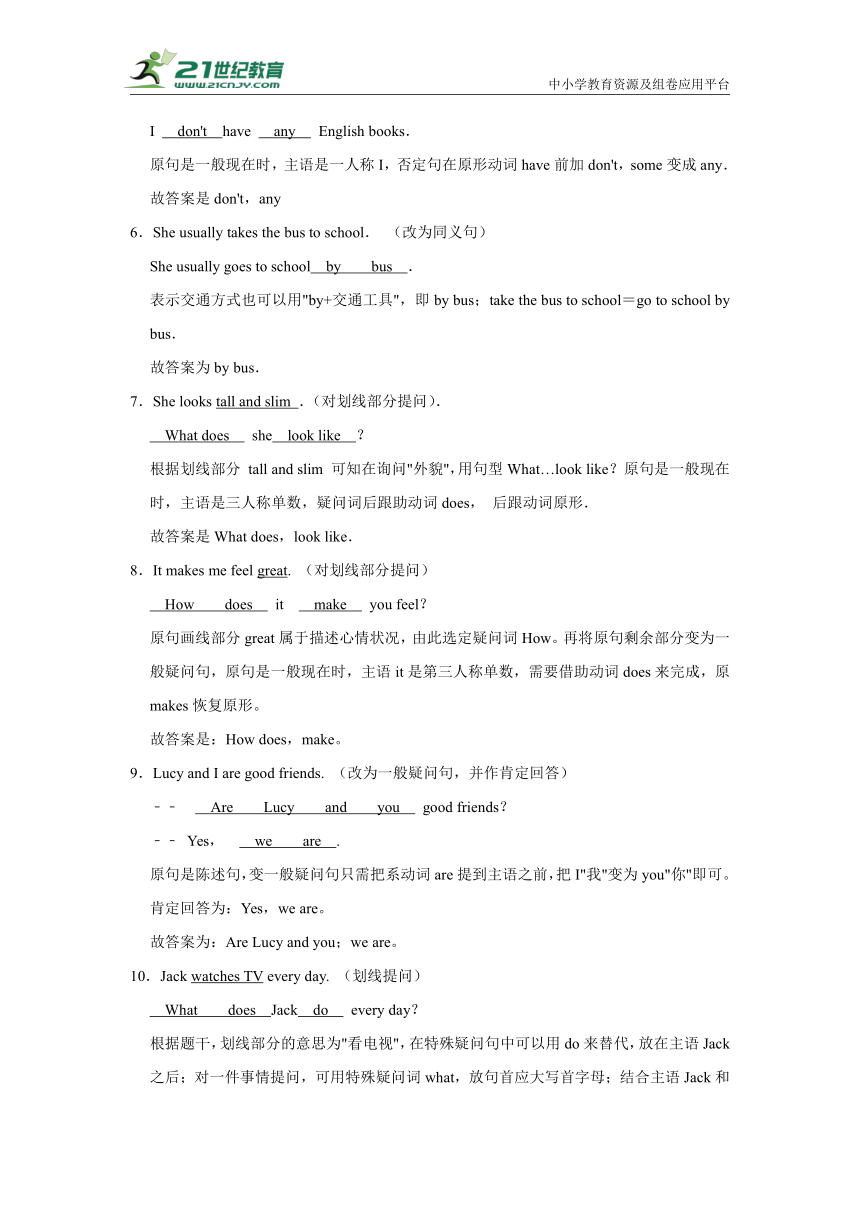牛津译林版英语七年级上册句型转换复习练习(含答案及解析)
文档属性
| 名称 | 牛津译林版英语七年级上册句型转换复习练习(含答案及解析) |  | |
| 格式 | docx | ||
| 文件大小 | 131.0KB | ||
| 资源类型 | 试卷 | ||
| 版本资源 | 牛津译林版 | ||
| 科目 | 英语 | ||
| 更新时间 | 2022-11-09 13:45:12 | ||
图片预览




文档简介
中小学教育资源及组卷应用平台
牛津译林版英语七年级上册句型转换复习练习
1.The boy does his homework every evening. (改为否定句)
The boy his homework every evening.
2.The man in a white shirt is our English teacher.(划线部分提问)
is your English teacher?
3.They always go to the Dancing Club on Saturday and Sunday. (同义句)
They always go to the Dancing Club .
4.The boy with glasses is my cousin. (对划线部分提问)
is your cousin?
5.I have some English books.(变成否定句)
I have English books.
6.She usually takes the bus to school. (改为同义句)
She usually goes to school .
7.She looks tall and slim .(对划线部分提问).
she ?
8.It makes me feel great. (对划线部分提问)
it you feel?
9.Lucy and I are good friends. (改为一般疑问句,并作肯定回答)
﹣﹣ good friends?
﹣﹣ Yes, .
10.Jack watches TV every day. (划线提问)
Jack every day?
11.The film is very interesting.(对画线部分提问)
the film?
12.The children play games after school.(把主语改为单数)
The games after school.
13.She drinks milks every morning. (改一般疑问句,并作否定回答)
she milk every morning?
,she .
14.Dad always has lots of things to do. (改为同义句)
Dad always .
15.They do after﹣school activities in the playground every day.(否定句)
They after﹣school activities in the playground every day.
16.He wants to go to school by bike. (对画线部分提问)
he go to school?
17.My family go to the park on Sundays.(一般疑问句)
family to the park on Sundays?
18.Which book do you like best? (同义句)
Which is book?
19.Simon is from America. (同义句)
Simon from America.
20.Does he play tennis well?(同义句)
Is he tennis?
21.What else do you want to buy? (保持句意基本不变)
What do you want to buy?
22.He often washes the bowls after supper. (改为一般疑问句)
he often the bowls after supper?
23.What other things do you like to do? (改为同义句)
What do you like to do?
24.She and I go to school by bus. (同义句)
She a bus to school me.
25.He takes good care of his sister. (同义句)
He looks his sister .
26.He isn't a good football player.(同义句)
He football.
27.I have short hair. (同义句)
is .
28.I want to be a policeman.(划线部分提问)
you want ?
29.Eddie walks to his bowl many times a day. (对划线部分提问)
Eddie to his bowl?
30.My school is near the shop. (对画线部分提问)
your school?
参考答案
1.The boy does his homework every evening. (改为否定句)
The boy doesn't do his homework every evening.
原句是一般现在时,其否定句在三人称单数动词does前加doesn't, does还原成原形do
故答案为 doesn't do
2.The man in a white shirt is our English teacher.(划线部分提问)
Which man is your English teacher?
划线部分in a white shirt 作定语,可知用疑问词which,修饰名词man,原句是含be动词的一般现在时,疑问词后跟is
故答案为 Which man
3.They always go to the Dancing Club on Saturday and Sunday. (同义句)
They always go to the Dancing Club on the weekends .
考查同义句.根据Saturday and Sunday.星期六和星期日,即weekend周末;on Saturday and Sunday在星期六和星期日,即在周末,on the weekends.
故答案为:on the weekends.
4.The boy with glasses is my cousin. (对划线部分提问)
Which boy is your cousin?
根据题干,可知要求就划线部分提问,被划线部分的意思是" 戴眼镜的",是指哪一个,用"which"提问.which boy哪个男孩.
故答案为Which boy.
5.I have some English books.(变成否定句)
I don't have any English books.
原句是一般现在时,主语是一人称I,否定句在原形动词have前加don't,some变成any.
故答案是don't,any
6.She usually takes the bus to school. (改为同义句)
She usually goes to school by bus .
表示交通方式也可以用"by+交通工具",即by bus;take the bus to school=go to school by bus.
故答案为by bus.
7.She looks tall and slim .(对划线部分提问).
What does she look like ?
根据划线部分 tall and slim 可知在询问"外貌",用句型What…look like?原句是一般现在时,主语是三人称单数,疑问词后跟助动词does, 后跟动词原形.
故答案是What does,look like.
8.It makes me feel great. (对划线部分提问)
How does it make you feel?
原句画线部分great属于描述心情状况,由此选定疑问词How。再将原句剩余部分变为一般疑问句,原句是一般现在时,主语it是第三人称单数,需要借助动词does来完成,原makes恢复原形。
故答案是:How does,make。
9.Lucy and I are good friends. (改为一般疑问句,并作肯定回答)
﹣﹣ Are Lucy and you good friends?
﹣﹣ Yes, we are .
原句是陈述句,变一般疑问句只需把系动词are提到主语之前,把I"我"变为you"你"即可。肯定回答为:Yes,we are。
故答案为:Are Lucy and you;we are。
10.Jack watches TV every day. (划线提问)
What does Jack do every day?
根据题干,划线部分的意思为"看电视",在特殊疑问句中可以用do来替代,放在主语Jack之后;对一件事情提问,可用特殊疑问词what,放句首应大写首字母;结合主语Jack和实义动词watch,可知需要借助助动词does,放在疑问词之后。
故答案为:What does;do。
11.The film is very interesting.(对画线部分提问)
How is the film?
根据题干,被划线部分的意思是"非常有趣",对看法的提问,用how。
故答案为:How is。
12.The children play games after school.(把主语改为单数)
The child plays games after school.
句子中children的单数形式是child,主语是单数形式,谓语动词使用第三人称单数形式plays。
故填child ,plays。
13.She drinks milks every morning. (改一般疑问句,并作否定回答)
Does she drink milk every morning?
No ,she doesn't .
原句She drinks...every morning.是一般现在时,主语she第三人称单数,谓语动词drinks是动词drink的第三人称单数形式,改为一般疑问句,助动词用does,后接动词原形。Does she drink...?作否定回答,要用No,后接简短的否定回答:No,she doesn't.
故填Does;drink;No;doesn't.
14.Dad always has lots of things to do. (改为同义句)
Dad is always busy .
原句have lots of things to do有许多事情要做,可以转换成be busy很忙,主语Dad,第三人称单数形式,be动词用is。
故填is;busy.
15.They do after﹣school activities in the playground every day.(否定句)
They don't do after﹣school activities in the playground every day.
原句主语they,谓语动词do,时间状语every day,用于一般现在时,改为否定句,助动词don't+动词原形。
故填don't do.
16.He wants to go to school by bike. (对画线部分提问)
How does he want to go to school?
根据题干,被划线部分的意思是"骑自行车",对交通方式的提问,用how,后接一般疑问句。主语he第三人称单数形式,wants是动词want的第三人称单数形式,助动词does,后接动词原形。
故填How does,want to.
17.My family go to the park on Sundays.(一般疑问句)
Do your family go to the park on Sundays?
主语my family我的家人,集体名词,谓语动词go,时间状语on Sundays用于一般现在时,改为一般疑问句,助动词do,后接动词原形,物主代词my,换成your。
故填Do your;go.
18.Which book do you like best? (同义句)
Which is your favourite book?
根据题干,可知原句中含有词组like best,表示"最喜欢的",其同义词为favourite,favourite为形容词,修饰名词book,原句中的主语you应换成形容词性物主代词your,修饰favourite book。
故答案为:your favourite。
19.Simon is from America. (同义句)
Simon comes from America.
根据题干,可知原句中含有词组be from,其同义词词组为come from,都表示"来自......",主语Simon为第三人称单数,因此come应用三单形式comes。
故答案为:comes。
20.Does he play tennis well?(同义句)
Is he good at playing tennis?
根据题干,可知原句中paly tennis well表示"网球打得好",结合同义句中的be动词,可推断同义词词组为be good at,后加doing的形式,表示"擅长做某事",play的动名词为playing。
故答案为:good at playing。
21.What else do you want to buy? (保持句意基本不变)
What other things do you want to buy?
含有实义动词的一般现在时的特殊疑问句改为同义句.因 句式: What else…?就相当于What other things…?因此句子可变成:What other things do you want to buy ?
故答案为:other things.
22.He often washes the bowls after supper. (改为一般疑问句)
Does he often wash the bowls after supper?
原句是一般现在时, 主语是三人称单数he,其一般疑问句在句前加Does,washes还原成原形wash.
故答案为 Does wash
23.What other things do you like to do? (改为同义句)
What else do you like to do?
含有实义动词的一般现在时的一般疑问句改为同义句.因What other things …?就相当于What else …?因此句子可变成:What else do you like to do?
故答案为:else.
24.She and I go to school by bus. (同义句)
She takes a bus to school with me.
by bus=take a bus;与某人译为 with sb
故答案为 takes;with。
25.He takes good care of his sister. (同义句)
He looks after his sister well .
非常照顾用take good care of或者 look after sb well
故答案为after;well。
26.He isn't a good football player.(同义句)
He is not good at football.
他不是一个好的足球运动员意为他不擅长足球,不擅长be not good at,
故答案为 is not good at。
27.I have short hair. (同义句)
My hair is short .
my hair 我的头发;short短的。I have short hair.=My hair is short.我留着短发=我的头发是短的。
故答案为My hair;short。
28.I want to be a policeman.(划线部分提问)
What do you want to be ?
划线部分a policeman表示职业,疑问词用what,一人称I 变二人称you,后跟助动词do。
故答案是What do;to be。
29.Eddie walks to his bowl many times a day. (对划线部分提问)
How often does Eddie walk to his bowl?
划线部分many times a day表示频率,疑问词用how often多久一次,原句是一般现在时,主语是第三人称单数,疑问词后跟助动词does,第三人称单数动词还原。
故答案是How often does;walk。
30.My school is near the shop. (对画线部分提问)
Where is your school?
根据题干,被划线部分的意思是"在商店旁边",对位置的提问,用where。
故答案为:Where is。
牛津译林版英语七年级上册句型转换复习练习
1.The boy does his homework every evening. (改为否定句)
The boy his homework every evening.
2.The man in a white shirt is our English teacher.(划线部分提问)
is your English teacher?
3.They always go to the Dancing Club on Saturday and Sunday. (同义句)
They always go to the Dancing Club .
4.The boy with glasses is my cousin. (对划线部分提问)
is your cousin?
5.I have some English books.(变成否定句)
I have English books.
6.She usually takes the bus to school. (改为同义句)
She usually goes to school .
7.She looks tall and slim .(对划线部分提问).
she ?
8.It makes me feel great. (对划线部分提问)
it you feel?
9.Lucy and I are good friends. (改为一般疑问句,并作肯定回答)
﹣﹣ good friends?
﹣﹣ Yes, .
10.Jack watches TV every day. (划线提问)
Jack every day?
11.The film is very interesting.(对画线部分提问)
the film?
12.The children play games after school.(把主语改为单数)
The games after school.
13.She drinks milks every morning. (改一般疑问句,并作否定回答)
she milk every morning?
,she .
14.Dad always has lots of things to do. (改为同义句)
Dad always .
15.They do after﹣school activities in the playground every day.(否定句)
They after﹣school activities in the playground every day.
16.He wants to go to school by bike. (对画线部分提问)
he go to school?
17.My family go to the park on Sundays.(一般疑问句)
family to the park on Sundays?
18.Which book do you like best? (同义句)
Which is book?
19.Simon is from America. (同义句)
Simon from America.
20.Does he play tennis well?(同义句)
Is he tennis?
21.What else do you want to buy? (保持句意基本不变)
What do you want to buy?
22.He often washes the bowls after supper. (改为一般疑问句)
he often the bowls after supper?
23.What other things do you like to do? (改为同义句)
What do you like to do?
24.She and I go to school by bus. (同义句)
She a bus to school me.
25.He takes good care of his sister. (同义句)
He looks his sister .
26.He isn't a good football player.(同义句)
He football.
27.I have short hair. (同义句)
is .
28.I want to be a policeman.(划线部分提问)
you want ?
29.Eddie walks to his bowl many times a day. (对划线部分提问)
Eddie to his bowl?
30.My school is near the shop. (对画线部分提问)
your school?
参考答案
1.The boy does his homework every evening. (改为否定句)
The boy doesn't do his homework every evening.
原句是一般现在时,其否定句在三人称单数动词does前加doesn't, does还原成原形do
故答案为 doesn't do
2.The man in a white shirt is our English teacher.(划线部分提问)
Which man is your English teacher?
划线部分in a white shirt 作定语,可知用疑问词which,修饰名词man,原句是含be动词的一般现在时,疑问词后跟is
故答案为 Which man
3.They always go to the Dancing Club on Saturday and Sunday. (同义句)
They always go to the Dancing Club on the weekends .
考查同义句.根据Saturday and Sunday.星期六和星期日,即weekend周末;on Saturday and Sunday在星期六和星期日,即在周末,on the weekends.
故答案为:on the weekends.
4.The boy with glasses is my cousin. (对划线部分提问)
Which boy is your cousin?
根据题干,可知要求就划线部分提问,被划线部分的意思是" 戴眼镜的",是指哪一个,用"which"提问.which boy哪个男孩.
故答案为Which boy.
5.I have some English books.(变成否定句)
I don't have any English books.
原句是一般现在时,主语是一人称I,否定句在原形动词have前加don't,some变成any.
故答案是don't,any
6.She usually takes the bus to school. (改为同义句)
She usually goes to school by bus .
表示交通方式也可以用"by+交通工具",即by bus;take the bus to school=go to school by bus.
故答案为by bus.
7.She looks tall and slim .(对划线部分提问).
What does she look like ?
根据划线部分 tall and slim 可知在询问"外貌",用句型What…look like?原句是一般现在时,主语是三人称单数,疑问词后跟助动词does, 后跟动词原形.
故答案是What does,look like.
8.It makes me feel great. (对划线部分提问)
How does it make you feel?
原句画线部分great属于描述心情状况,由此选定疑问词How。再将原句剩余部分变为一般疑问句,原句是一般现在时,主语it是第三人称单数,需要借助动词does来完成,原makes恢复原形。
故答案是:How does,make。
9.Lucy and I are good friends. (改为一般疑问句,并作肯定回答)
﹣﹣ Are Lucy and you good friends?
﹣﹣ Yes, we are .
原句是陈述句,变一般疑问句只需把系动词are提到主语之前,把I"我"变为you"你"即可。肯定回答为:Yes,we are。
故答案为:Are Lucy and you;we are。
10.Jack watches TV every day. (划线提问)
What does Jack do every day?
根据题干,划线部分的意思为"看电视",在特殊疑问句中可以用do来替代,放在主语Jack之后;对一件事情提问,可用特殊疑问词what,放句首应大写首字母;结合主语Jack和实义动词watch,可知需要借助助动词does,放在疑问词之后。
故答案为:What does;do。
11.The film is very interesting.(对画线部分提问)
How is the film?
根据题干,被划线部分的意思是"非常有趣",对看法的提问,用how。
故答案为:How is。
12.The children play games after school.(把主语改为单数)
The child plays games after school.
句子中children的单数形式是child,主语是单数形式,谓语动词使用第三人称单数形式plays。
故填child ,plays。
13.She drinks milks every morning. (改一般疑问句,并作否定回答)
Does she drink milk every morning?
No ,she doesn't .
原句She drinks...every morning.是一般现在时,主语she第三人称单数,谓语动词drinks是动词drink的第三人称单数形式,改为一般疑问句,助动词用does,后接动词原形。Does she drink...?作否定回答,要用No,后接简短的否定回答:No,she doesn't.
故填Does;drink;No;doesn't.
14.Dad always has lots of things to do. (改为同义句)
Dad is always busy .
原句have lots of things to do有许多事情要做,可以转换成be busy很忙,主语Dad,第三人称单数形式,be动词用is。
故填is;busy.
15.They do after﹣school activities in the playground every day.(否定句)
They don't do after﹣school activities in the playground every day.
原句主语they,谓语动词do,时间状语every day,用于一般现在时,改为否定句,助动词don't+动词原形。
故填don't do.
16.He wants to go to school by bike. (对画线部分提问)
How does he want to go to school?
根据题干,被划线部分的意思是"骑自行车",对交通方式的提问,用how,后接一般疑问句。主语he第三人称单数形式,wants是动词want的第三人称单数形式,助动词does,后接动词原形。
故填How does,want to.
17.My family go to the park on Sundays.(一般疑问句)
Do your family go to the park on Sundays?
主语my family我的家人,集体名词,谓语动词go,时间状语on Sundays用于一般现在时,改为一般疑问句,助动词do,后接动词原形,物主代词my,换成your。
故填Do your;go.
18.Which book do you like best? (同义句)
Which is your favourite book?
根据题干,可知原句中含有词组like best,表示"最喜欢的",其同义词为favourite,favourite为形容词,修饰名词book,原句中的主语you应换成形容词性物主代词your,修饰favourite book。
故答案为:your favourite。
19.Simon is from America. (同义句)
Simon comes from America.
根据题干,可知原句中含有词组be from,其同义词词组为come from,都表示"来自......",主语Simon为第三人称单数,因此come应用三单形式comes。
故答案为:comes。
20.Does he play tennis well?(同义句)
Is he good at playing tennis?
根据题干,可知原句中paly tennis well表示"网球打得好",结合同义句中的be动词,可推断同义词词组为be good at,后加doing的形式,表示"擅长做某事",play的动名词为playing。
故答案为:good at playing。
21.What else do you want to buy? (保持句意基本不变)
What other things do you want to buy?
含有实义动词的一般现在时的特殊疑问句改为同义句.因 句式: What else…?就相当于What other things…?因此句子可变成:What other things do you want to buy ?
故答案为:other things.
22.He often washes the bowls after supper. (改为一般疑问句)
Does he often wash the bowls after supper?
原句是一般现在时, 主语是三人称单数he,其一般疑问句在句前加Does,washes还原成原形wash.
故答案为 Does wash
23.What other things do you like to do? (改为同义句)
What else do you like to do?
含有实义动词的一般现在时的一般疑问句改为同义句.因What other things …?就相当于What else …?因此句子可变成:What else do you like to do?
故答案为:else.
24.She and I go to school by bus. (同义句)
She takes a bus to school with me.
by bus=take a bus;与某人译为 with sb
故答案为 takes;with。
25.He takes good care of his sister. (同义句)
He looks after his sister well .
非常照顾用take good care of或者 look after sb well
故答案为after;well。
26.He isn't a good football player.(同义句)
He is not good at football.
他不是一个好的足球运动员意为他不擅长足球,不擅长be not good at,
故答案为 is not good at。
27.I have short hair. (同义句)
My hair is short .
my hair 我的头发;short短的。I have short hair.=My hair is short.我留着短发=我的头发是短的。
故答案为My hair;short。
28.I want to be a policeman.(划线部分提问)
What do you want to be ?
划线部分a policeman表示职业,疑问词用what,一人称I 变二人称you,后跟助动词do。
故答案是What do;to be。
29.Eddie walks to his bowl many times a day. (对划线部分提问)
How often does Eddie walk to his bowl?
划线部分many times a day表示频率,疑问词用how often多久一次,原句是一般现在时,主语是第三人称单数,疑问词后跟助动词does,第三人称单数动词还原。
故答案是How often does;walk。
30.My school is near the shop. (对画线部分提问)
Where is your school?
根据题干,被划线部分的意思是"在商店旁边",对位置的提问,用where。
故答案为:Where is。
同课章节目录
- 预备课程
- Lesson 1 Nice to meet you !
- Lesson 2 A happy family
- Lesson 3 A nice school
- Lesson 4 You look cool !
- Lesson 5 Wonderful things
- Lesson 6 Have nice food
- Lesson 7 Enjoy our days
- Lesson 8 Let's have fun !
- Unit 1 This is me
- Unit 2 Let's play sports
- Unit 3 Welcome to our school
- Unit 4 My day
- Unit 5 Let’s celebrate
- Unit 6 Food and lifestyle
- Unit 7 Shopping
- Unit 8 Fashion
